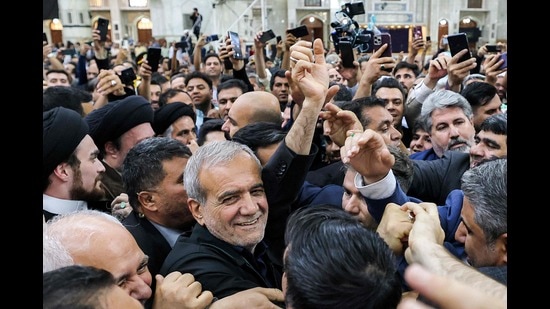Jul 19, 2024 09:02 PM IST
At a time when Iran and the region are in a potentially disastrous situation, the new president will need the art of complexity management to be able to solve the endless economic problems and an escalating legitimacy crisis of the Islamic Republic of Iran.
The election of Masoud Pezeshkian as the ninth Iranian President was no surprise for all those eligible voters who refused to vote or hesitated to approve the Iranian regime nearly two years after the national unrest which followed the death of Mahsa Amini in custody of the moral police in Tehran. Hundreds were killed and thousands arrested as the authorities sought to crush the protests. Reformist Pezeshkian won with 53.7% of the vote, defeating hardliner Saeed Jalili in the run-off polls.

According to Iran’s interior ministry, over 30 million Iranians voted in the run-off presidential election, higher than the 40% participation in the first round on June 28. The voting time was extended by two hours. However, many videos and photos posted on Iranian social media showed empty polling stations around Iran. Also, various political groups outside Iran gathered in front of the Iranian embassies and consulates and urged the electorate to boycott the election. This presidential election recorded the lowest voter turnout in the Islamic Republic of Iran since 1979. In a speech on June 25, Iran’s supreme leader, Ayatollah Ali Khamenei, called for a large turnout in the election in an effort to stop the enemies of the Islamic Republic of Iran. Even the prisoners in Saqqez, in western Iran, were compelled to participate in the presidential election. However, many Iranians seem to believe that this election, like many others, was staged and prepared by the entourage of the Supreme Leader and the Iranian Revolutionary Guards.
The new President is a reformist who has never been a serious critic of velayat-e faqih, the theocratic system under which the Supreme Leader has absolute authority. Pezeshkian, born in 1954, in Mahabad in northwestern Iran to an Azeri father and a Kurdish mother, was the health minister during the presidency of Mohammad Khatami, but he gained prominence for his stance against the crackdown of the 2022 urban protests. During these protests, he said in an interview with Iran’s TV: “I bear part of the blame, the distinguished religious scholars and the mosques bear part of the blame, and the (Iranian) broadcasting authority bears part of the blame. Everybody should step forward and be held accountable, rather than capture that girl, beat her up, and eventually deliver her body to her family.” Pezeshkian also aligned himself with the former Iranian foreign minister, Mohammad Javad Zarif, who negotiated Iran’s 2015 nuclear deal with the US and the European Union. He later served as a deputy parliament speaker and backed the cause of the Iranian moderates.
Pezeshkian’s win is a way for the Supreme Leader and Iran’s Revolutionary Guards to find a solution to Iran’s growing legitimacy crisis and the succession battle that will follow 85-year-old Khamenei’s eventual passing. Despite the appearances, Khamenei and his hardline allies played in a manner to ensure that the polls produced no surprise and gave the impression that Pezeshkian’s victory was difficult to obtain. However, the truth is quite the opposite, since both reformists and the conservatives, who are loyal to the Iranian establishment, feared that a visibly rigged and undemocratic election would leave Iran’s rulers totally isolated from a population already tired of the theocratic regime with its tough oppressive laws and economic mismanagement. Versed in the art of regime survival, Iran’s leaders smoothly opened the doors of the political system through the election of a moderate President who is also acceptable to the military and paramilitary apparatus. Whatever the future of President Pezeshkian, one thing is clear. The war in Gaza showed the Iranian establishment that Iran’s ongoing move to hegemony in West Asia is in urgent need for a back stage United States (US)-Iran diplomacy, especially if the American election in November produces a strong anti-Iran president like Donald Trump.
This said, the suspicious death of former President Ebrahim Raisi and his foreign minister, Hossein Amir-Abdollahian, in a helicopter crash leaves the interpretation open to those commentators who rightly believe that the so-called Iranian reformists function only as safety valves for a violent face-to-face encounter between the ultra-conservatives themselves, who represent different camps and try to reshape the Iranian political system in their own way by searching alliances between clerical autocrats and security and military officials. As for the reformists, they hope to have a piece of the cake, in spite of not having been invited to the party. That is why, if Pezeshkian and his “reformist” supporters refuse to play it smoothly, the friction between him as an elected President and the entourage of the unelected Supreme Leader will be stronger at every challenge. This balancing act will require from Pezeshkian the unproven skill of moderating the ultra-hardliner’s drive for hegemonic power without shutting the door on the face of the absolutist clerics or the warmonger Revolutionary Guards. Is President Pezeshkian witty enough to stop the Revolutionary Guards from intensifying repression at home and confrontation with the US? At a time when Iran and the region are in a potentially disastrous situation, the new president will need the art of complexity management to be able to solve the endless economic problems and an escalating legitimacy crisis of the Islamic Republic of Iran.
Ramin Jahanbegloo, an Iranian philosopher, is director, Mahatma Gandhi Centre for PeaceStudies, Jindal Global Law School. The views expressed are personal
Story Saved


